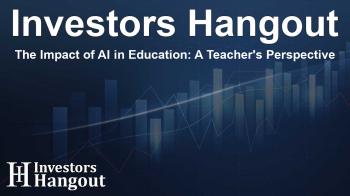The Impact of AI in Education: A Teacher's Perspective

Understanding AI's Role in Modern Education
As students prepare to embark on a new academic year, educators are faced with a pivotal question: Should they integrate artificial intelligence (AI) into their teaching methods? More and more, the conversation is evolving from skepticism to exploration of its potential benefits.
Teachers' Views on AI in the Classroom
Ludrick Cooper, an eighth-grade teacher, has recently shifted his stance on using AI. Initially opposed to this technology in educational settings, he's now recognizing it as a useful resource. "This is the new encyclopedia," he explained, illustrating a growing trend in education.
Engagement and Accessibility
One of the main advantages of AI is its ability to enhance lesson engagement and provide information accessibly. Tools powered by AI can offer customized educational experiences tailored to individual student needs, including those with visual impairments or learning disabilities.
Concerns About AI Implementation
Despite the promising aspects, many experts express caution over the adoption of AI in education. Concerns include the widening gap between students from different socio-economic backgrounds and the potential for mental health issues, along with easier avenues for academic dishonesty.
The Dual Nature of Technology in Learning
The analogy of fire resonates well in this discussion, according to Sarah Howorth, a professor of Special Education. Just as fire can be used for cooking or cause destruction, the same can be said of AI in education. It's a powerful tool, but its misuse can lead to significant challenges.
Innovative Tools and Partnerships
In recent months, various platforms have created specialized AI tools aimed at supporting classroom learning. OpenAI, for example, launched a feature called 'Study Mode', which encourages active engagement by guiding students through their educational tasks rather than delivering straightforward answers.
Creating Effective Learning Environments
OpenAI's Vice President of Education, Leah Belsky, stated that this is a crucial time to align AI technologies with educational benefits. Collaborative efforts like those between OpenAI and Instructure aim to create AI-enhanced lessons while monitoring student progress effectively.
Social Interaction in Learning
While technological advancements excite many educators, there are apprehensions about the social dynamics of learning. Stanford University's Matthew Rascoff pointed out that traditional classroom environments foster collaboration and community. He worries that AI may inadvertently isolate students, depriving them of developing necessary interpersonal skills.
Perspectives from Educators
Concerns regarding AI's role vary among educators. Lauren Monaco, a pre-K and kindergarten teacher in New York City, warns that AI may become a crutch, undermining the authentic learning process that goes beyond processing information.
Conversely, Robin Lake, from Arizona State University, views the surge in AI usage positively. She emphasizes the importance of preparing students for an economy increasingly dominated by artificial intelligence, urging educators to consider how these skills will facilitate future success.
Conclusion: Embracing Change in Education
As the academic landscape shifts, the debate surrounding AI's role in education will continue to evolve. The insights shared by teachers illustrate a complex dynamic between leveraging technology for enhanced learning and preserving the critical interactions that traditional education fosters. Balancing these aspects carefully will determine how effectively AI can support future generations in their educational journeys.
Frequently Asked Questions
What benefits does AI bring to the classroom?
AI can enhance engagement, make information accessible, and assist students with special needs.
Are there any drawbacks to using AI in education?
Yes, concerns include widening education gaps, mental health impacts, and the potential for cheating.
How is AI comparable to fire in education?
Both AI and fire can be powerful tools that offer benefits but can also lead to negative consequences if not used correctly.
What is 'Study Mode' in AI?
'Study Mode' is a feature by OpenAI that provides step-by-step guidance for students, promoting active learning rather than simply delivering answers.
What do educators think about AI's impact on social interactions?
Some educators believe AI tools may diminish the collaborative aspect of learning, which is crucial for developing social skills.
About The Author
Contact Logan Wright privately here. Or send an email with ATTN: Logan Wright as the subject to contact@investorshangout.com.
About Investors Hangout
Investors Hangout is a leading online stock forum for financial discussion and learning, offering a wide range of free tools and resources. It draws in traders of all levels, who exchange market knowledge, investigate trading tactics, and keep an eye on industry developments in real time. Featuring financial articles, stock message boards, quotes, charts, company profiles, and live news updates. Through cooperative learning and a wealth of informational resources, it helps users from novices creating their first portfolios to experts honing their techniques. Join Investors Hangout today: https://investorshangout.com/
The content of this article is based on factual, publicly available information and does not represent legal, financial, or investment advice. Investors Hangout does not offer financial advice, and the author is not a licensed financial advisor. Consult a qualified advisor before making any financial or investment decisions based on this article. This article should not be considered advice to purchase, sell, or hold any securities or other investments. If any of the material provided here is inaccurate, please contact us for corrections.

